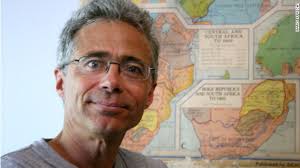
In March the CSSR was fortunate to host Professor Marc Epprecht to present on the topic of “Science, history and sexuality: Uganda’s scientific statement on homosexuality in context”. Professor Epprecht is an historian and currently the head of Global Development Studies at Queens University in Canada. His research interests span gender and sexuality specifically in the African context, having worked in both Lesotho and Zimbabwe.
The public lecture was well attended and many members of the audience were excited to engage with a prolific scholar of his stature. His first book which was based on his PhD was titled “This matter of women is getting very bad": Gender, development and politics in colonial Lesotho, 1870-1965”. He is probably most famous for his second book “Hungochani: The History of a Dissident Sexuality in Southern Africa” which was published in 2004. He won the Canadian Association of African Studies Joel Gregory Prize and the Desmond Tutu Award for Outstanding Contributions to the Study of Sexuality in Africa. As a gifted public speaker he was able to convey the crux of his research continues to challenge the statement that homosexuality is unAfrican. He explained carefully how despite the fact that there is historical evidence of men having sex with men in Africa, dating back to the early 1500s this myth continues to impact on hinder access to education and healthcare. He outlined how experiences for LGBTQI communities often differed in African countries depending on their colonial histories. Therefore the context in which gay rights were negotiated in former Portuguese colonies differed from the ways in which people in former British colonies (which had inherited the Roman-Dutch legal system) were able to navigate the legal terrain. Professor Epprecht’s conclusion is that even though the World Bank is able to show that lack of adequate access to healthcare for gay people is globally expensive; many political leaders believe that homosexual behavior does not serve the global economy. It is for this reason that it continues to be framed as deviant. It is his opinion that the focus on deviance continues because it conveniently deflects attention away from global inequality and mounting the evidence that the rich are getting richer and the poor are getting poorer.
He outlined how historically mainstream research on the topic has mostly focused on the causes of homosexuality. Not only has this kept the debate within the very narrow parameters of Nature versus Nurture but also primarily served the interests of African law makers who wanted simple evidence for political purposes. It is his contention that if the economy is not performing well it is more likely that the idea that Westernisation was to blame for introducing homosexuality would take root. His decade of research has shown that there is no simple solution to the continued problematisation of homosexuality as unAfrican. This myth has been constructed over centuries and intersects with discourses about religious beliefs, HIV and AIDS, activism, homophobia, the discreetness of African cultures and the mainstream research utilizing inaccurate science that has helped to create raced, classed and gendered stereotypes.
Many members of the audience were very excited about the opportunity to meet Professor Epprecht in person. A local LGBTQ activist described how hugely influential the publication of Hungochani was for people who were working on LGBTQ rights in the rural areas of Southern Africa.
It is rare to find a scholar like Marc Epprecht who has successfully combined his research with real world intellectual activism. Professor Epprecht has continued to publish widely and we look forward to the eagerly awaited Global Encyclopedia of Lesbian, Gay, Bisexual, Transgender and Queer History which is due to be publication later this year.
Written by Cassandra Ann Robertson-Ormston, a PhD candidate with the CSSR.
